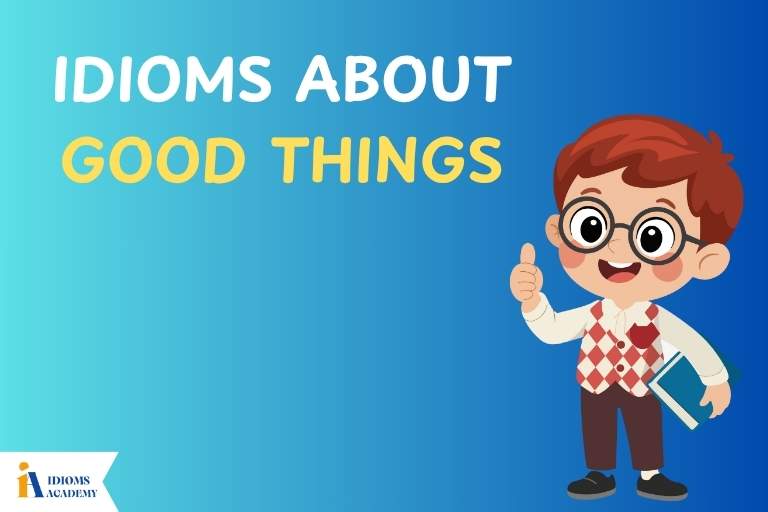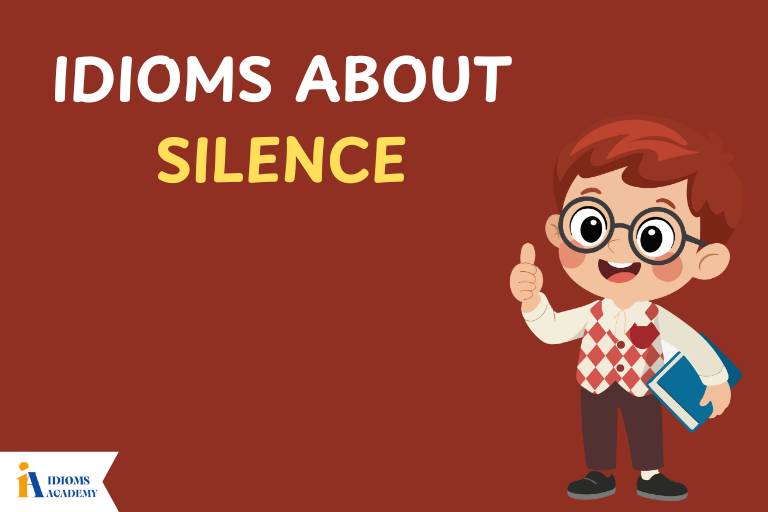Sometimes life feels unfair. Maybe your friend got more dessert, or someone blamed you for something you didn’t do. People often talk about these moments using special phrases. These are called idioms. Idioms are phrases that don’t mean exactly what the words say. They help us explain feelings in fun and simple ways.
In this article, we will look at idioms about unfairness. These sayings can help you speak clearly when something doesn’t feel right. You’ll learn what they mean, how to use them, and see examples you can understand. Whether it’s at school, home, or anywhere else, these idioms will help you talk about unfair things in a smart way.
Idioms About Unfairness
1. Cry foul
Meaning: To say something is unfair or wrong.
Example Sentence:
• Jack cried foul when his sister got a bigger slice of cake.
• The team cried foul when the referee made a bad call.
Other ways to say: Complain, call out unfairness
Fun Fact/Origin: This idiom comes from sports, where players protest unfair plays.
Usage: Used when someone feels something isn’t fair.
2. Tip the scales
Meaning: To make a situation unfair by giving one side an advantage.
Example Sentence:
• Giving her extra time tipped the scales in her favor.
• The rules tipped the scales against the new players.
Other ways to say: Make it unfair, shift balance
Fun Fact/Origin: Comes from weighing scales where a small weight can make one side heavier.
Usage: Used when something causes an unfair advantage.
3. Not playing fair
Meaning: Acting in a dishonest or tricky way.
Example Sentence:
• He wasn’t playing fair when he changed the game rules.
• It’s not playing fair if you hide the answers.
Other ways to say: Cheating, bending the rules
Fun Fact/Origin: From games and sports where fairness matters.
Usage: Used when someone doesn’t follow the rules.
4. Stack the deck
Meaning: To arrange things so one side has an unfair edge.
Example Sentence:
• The teacher stacked the deck by picking her favorite team.
• He stacked the deck to win the game.
Other ways to say: Set up unfairly, rig something
Fun Fact/Origin: Comes from card games where people might cheat by changing the cards.
Usage: Used when someone cheats to get an advantage.
5. A raw deal
Meaning: A situation where someone is treated unfairly.
Example Sentence:
• She got a raw deal when she was blamed for the mess.
• That test was a raw deal—it had questions we didn’t study.
Other ways to say: Treated unfairly, not right
Fun Fact/Origin: Comes from old ways of saying something was not cooked or done properly.
Usage: Used when someone feels wronged.
6. Favoritism
Meaning: Treating someone better than others unfairly.
Example Sentence:
• It felt like favoritism when only Jake got a prize.
• The coach showed favoritism by always picking the same kids.
Other ways to say: Playing favorites, unfair picking
Fun Fact/Origin: Comes from the word “favorite,” meaning someone who is liked more.
Usage: Used when someone is treated better without a good reason.
7. A slap in the face
Meaning: Something very unfair or insulting.
Example Sentence:
• Not getting picked felt like a slap in the face.
• It was a slap in the face when her idea was ignored.
Other ways to say: Insult, unfair action
Fun Fact/Origin: This comes from the idea of being hit suddenly and unfairly.
Usage: Used when someone feels hurt or disrespected.
8. Turn a blind eye
Meaning: To ignore unfair or wrong things on purpose.
Example Sentence:
• The teacher turned a blind eye to the kids cheating.
• Don’t turn a blind eye to bullying.
Other ways to say: Ignore unfairness, look the other way
Fun Fact/Origin: Comes from a British navy story about pretending not to see signals.
Usage: Used when someone pretends not to notice wrong behavior.
9. Double standard
Meaning: A rule that is unfairly applied differently to people.
Example Sentence:
• It’s a double standard if boys can stay out late but girls can’t.
• That’s a double standard—he got praised, but I got scolded.
Other ways to say: Unfair rules, unequal treatment
Fun Fact/Origin: “Double” means two sets of rules for different people.
Usage: Used when people are treated differently under the same rule.
10. Get the short end of the stick
Meaning: To receive the least or worst part of something.
Example Sentence:
• I got the short end of the stick when I had to clean alone.
• She always gets the short end of the stick in group work.
Other ways to say: Get treated poorly, be left out
Fun Fact/Origin: From an old way of saying someone got the bad side of a deal.
Usage: Used when someone gets a bad deal.
11. Bend the rules
Meaning: To change rules in a way that isn’t fair.
Example Sentence:
• She bent the rules to let her friend win.
• It’s unfair to bend the rules only for some people.
Other ways to say: Cheat, break the rules a little
Fun Fact/Origin: Bending means changing the shape slightly, just like changing rules a little.
Usage: Used when rules are changed unfairly.
12. Play dirty
Meaning: To act unfairly to win or get ahead.
Example Sentence:
• He played dirty by hiding the ball.
• That team played dirty during the game.
Other ways to say: Cheat, use tricks
Fun Fact/Origin: Often used in sports when someone doesn’t follow fair play.
Usage: Used when someone does wrong to win.
13. On the losing end
Meaning: Being the one treated unfairly or getting the worst result.
Example Sentence:
• She was on the losing end when the prize was shared unfairly.
• He’s always on the losing end in trades.
Other ways to say: Treated badly, got the worst of it
Fun Fact/Origin: Comes from competitions where one side loses unfairly.
Usage: Used when someone ends up with less or nothing.
14. Not a level playing field
Meaning: A situation where people don’t have the same chance.
Example Sentence:
• It’s not a level playing field when some kids get hints.
• Without the same books, the contest wasn’t on a level playing field.
Other ways to say: Not fair, uneven chance
Fun Fact/Origin: Comes from sports fields—if the field isn’t flat, it’s unfair.
Usage: Used when things aren’t fair for everyone.
15. Pass the buck
Meaning: To blame someone else unfairly.
Example Sentence:
• She passed the buck when she blamed me for the mess.
• Don’t pass the buck—just admit your mistake.
Other ways to say: Shift blame, avoid taking blame
Fun Fact/Origin: “Buck” was a marker in poker games passed to the next player.
Usage: Used when someone avoids blame by blaming others.
16. Throw under the bus
Meaning: To blame or hurt someone to protect yourself.
Example Sentence:
• He threw me under the bus to stay out of trouble.
• Don’t throw your friend under the bus to win.
Other ways to say: Betray, blame unfairly
Fun Fact/Origin: The image of someone being thrown in danger just to save another.
Usage: Used when someone is unfairly blamed or harmed.
17. Have it in for someone
Meaning: To treat someone unfairly again and again.
Example Sentence:
• It feels like the teacher has it in for me.
• He always picks on Max—it seems he has it in for him.
Other ways to say: Pick on, target
Fun Fact/Origin: Comes from the idea of holding a grudge or dislike for someone.
Usage: Used when someone is treated unfairly many times.
18. A losing battle
Meaning: Trying hard but being treated unfairly so you can’t win.
Example Sentence:
• Arguing with him is a losing battle.
• She fought a losing battle trying to get her idea noticed.
Other ways to say: Can’t win, unfair fight
Fun Fact/Origin: Comes from war terms when a side knows it can’t win.
Usage: Used when the odds are unfair and success is unlikely.
19. Blow the whistle
Meaning: To report unfair or wrong actions.
Example Sentence:
• He blew the whistle on kids who were cheating.
• She blew the whistle when she saw unfair rules.
Other ways to say: Tell on, report
Fun Fact/Origin: Comes from sports, where refs blow whistles to stop unfair play.
Usage: Used when someone points out unfair behavior.
20. Skew the results
Meaning: To change or affect results in a way that makes it unfair.
Example Sentence:
• Adding late scores skewed the results.
• He skewed the results by only showing good answers.
Other ways to say: Mess up, make unfair
Fun Fact/Origin: “Skew” means to twist or make uneven.
Usage: Used when something is changed to make results wrong.
21. Tilt the odds
Meaning: To make it harder or easier for someone unfairly.
Example Sentence:
• Giving her more chances tilted the odds in her favor.
• The uneven rules tilted the odds against us.
Other ways to say: Change the chance, make unfair
Fun Fact/Origin: From games where chances are supposed to be equal.
Usage: Used when chances are unfairly changed.
22. Pull strings
Meaning: To use unfair influence to get something.
Example Sentence:
• He pulled strings to get into the team.
• She got picked after her dad pulled some strings.
Other ways to say: Use unfair help, get special treatment
Fun Fact/Origin: Comes from puppets—someone in control pulls the strings.
Usage: Used when someone uses connections to get ahead.
23. One-sided
Meaning: Only fair to one person or group.
Example Sentence:
• The game rules were one-sided.
• It was a one-sided story that left out my side.
Other ways to say: Biased, unfair
Fun Fact/Origin: “Side” refers to support—one side gets all the help.
Usage: Used when something benefits only one group.
24. Take sides
Meaning: To support one person unfairly.
Example Sentence:
• Mom always takes my sister’s side.
• It’s not fair to take sides without hearing both people.
Other ways to say: Choose favorites, support unfairly
Fun Fact/Origin: Common in family or friend arguments.
Usage: Used when someone picks one person instead of being fair.
25. Unfair advantage
Meaning: A benefit someone has that others don’t.
Example Sentence:
• Having the answers early gave him an unfair advantage.
• It’s an unfair advantage to use cheat codes in a game.
Other ways to say: Head start, special help
Fun Fact/Origin: “Advantage” means a better chance—“unfair” makes it wrong.
Usage: Used when one side has extra help.
26. Weighted in favor of
Meaning: Made to help one person more than others.
Example Sentence:
• The contest felt weighted in favor of the older kids.
• The rules were weighted in favor of his team.
Other ways to say: Biased, unfairly helping
Fun Fact/Origin: Comes from weighing scales that tip more to one side.
Usage: Used when something is planned to help someone unfairly.
27. Break the rules
Meaning: To not follow rules, which is unfair to others.
Example Sentence:
• She broke the rules by using a calculator.
• It’s not okay to break the rules and win.
Other ways to say: Cheat, not follow
Fun Fact/Origin: Rules are made to keep things fair—breaking them gives an edge.
Usage: Used when someone doesn’t follow fair rules.
28. Play favorites
Meaning: To treat someone better without a fair reason.
Example Sentence:
• The teacher plays favorites during class games.
• It’s unfair to play favorites with prizes.
Other ways to say: Favor someone, show bias
Fun Fact/Origin: “Favorite” means most liked—used unfairly here.
Usage: Used when someone is treated better without fairness.
Quiz: Idioms About Unfairness
Instructions: Choose the correct meaning for each idiom. Each question has one correct answer. Use what you’ve learned from the idioms to find the best choice.
Question Key
1. What does “cry foul” mean?
A) Celebrate a win
B) Say something is unfair
C) Clean up a mess
2. What does “get the short end of the stick” mean?
A) Get the better deal
B) Lose a game
C) Be treated unfairly
3. If someone is “not playing fair,” what are they doing?
A) Sharing fairly
B) Following all rules
C) Cheating or being tricky
4. What does “play favorites” mean?
A) Treat everyone equally
B) Pick someone without being fair
C) Choose randomly
5. If someone “throws you under the bus,” what are they doing?
A) Helping you
B) Blaming you to save themselves
C) Driving you to school
6. What does it mean to “bend the rules”?
A) Use rules as they are
B) Change the rules in a tricky way
C) Break something
7. If a game is “not a level playing field,” what does that mean?
A) It’s fair for everyone
B) The ground is bumpy
C) One side has an unfair advantage
8. What does “stack the deck” mean?
A) Play cards in a fun way
B) Make sure things are fair
C) Set things up to give someone an unfair edge
9. What does it mean to “turn a blind eye”?
A) Look closely at something
B) Pretend not to see something wrong
C) Blink quickly
10. If someone has an “unfair advantage,” what do they have?
A) A fair shot
B) An extra helper others don’t have
C) The same tools as others
Answer Key
- B) Say something is unfair
- C) Be treated unfairly
- C) Cheating or being tricky
- B) Pick someone without being fair
- B) Blaming you to save themselves
- B) Change the rules in a tricky way
- C) One side has an unfair advantage
- C) Set things up to give someone an unfair edge
- B) Pretend not to see something wrong
- B) An extra helper others don’t have
Wrapping Up
Talking about unfair things can be hard. Idioms make it easier. These special phrases help you explain when something doesn’t feel right. Now you know how to use them in real life.
Whether it’s a game, a classroom, or at home, you’ll understand and spot unfairness better. Keep using these idioms when you need to speak up. Words can make a big difference when used the right way.



